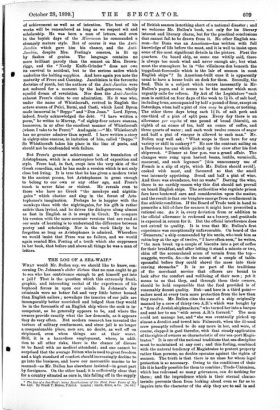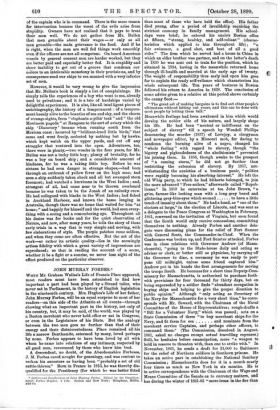THE LOG OF A SEA-W.A.IF.*
• The Log of a Sea-Waif: being Recollections of the First Four Years of My Sea Life. By Frank T. Hallett, F.R.G.S. London : Smith, Elder, dc Co. [Se. ed.] WHAT would Mr. Bullen say, we should like to know, con- cerning Dr. Johnson's obiter dictum that no man ought to go to sea who has contrivance enough to get himself put into a jail P That is the question which this extremely frank, graphic, and interesting recital of the experiences of his boyhood forces in upon our minds. In Johnson's day criminals were no better fed and very little better housed than English sailors ; nowadays the inmates of our jails are incomparably better nourished and lodged than they would be in the forecastle of an English ship where the cook is in- competent, as he generally appears to be, and where the owners provide exactly what the law demands, as it appears they do very often. But modern research has invented the torture of solitary confinement, and since jail is no longer a companionable place, men are, no doubt, as well off on shipboard, even when things are at their worst. Still, it is a hazardous employment, where, in addi- tion to all other risks, there is the chance :of disease • to be faced with no medical attendant ; and one cannot be surprised that the average Briton who is used to great freedom and a high standard of comfort should increasingly decline to go into the business, and leave our mercantile marine to be manned—as Mr. Bullen has elsewhere insisted—in great part by foreigners. On the other hand, it is sufficiently clear that for a country situated as ours is, this falling off in the supply of British seamen is nothing short of a national disaster ; and we welcome Mr. Ballen's book, not only for its literary interest and literary charm, but for the practical conclusions that cannot fail to be drawn from it. No other English sea- man—for Dana was an American—has written with full knowledge of life before the mast, and it is well to insist upon some of the most significant details in the picture. First the quarters. On board ship, as some one wittily said, there is always too much wind and never enough air; but what must the atmosphere be in "the villainous den beneath the topgallant-forecastle which is the lair of seamen in most English ships "P In American-built ones it is apparently usual to have a house built on deck for them. Secondly, the food. This is a subject which recurs incessantly in Mr- Bullen's pages, and it seems to be the matter which most urgently calls for reform. By Act of the Legislature "each man is entitled on four days of the week to 1 lb. of salt beef, including bone, accompanied by half a pound of flour, except on Saturdays, when half a pint of rice may be given, or nothing. The other three days bring each l lb. of salt pork and one-third of a pint of split peas. Every day there is an allowance per capita of one pound of bread (biscuit), an eighth of an ounce of tea, half an ounce of coffee, and three quarts of water ; and each week twelve ounces of sugar and half a pint of vinegar is allowed to each man." Mr. Bullen may well ask : "What scope is there here for any variety or skill in cookery P" He saw the contrast sailing on a Bordeaux barque which picked up the crew after his first shipwreck. "Dinner at four p.m. was a grand affair. The changes were rung upon haricot beans, lentils, vermicelli, macaroni, and such legumes" [this unnecessary use of French is a slip of style, which Mr. Bullen should avoid], cooked with meat, and flavoured so that the smell was intensely appetising. Bread and half a pint of wine. And there was abundance, but no waste." Barring the wine, there is no earthly reason why this diet should not prevail on board English ships. The authorities who regulate prison fare have bestowed care and consideration upon the matter, and the result is that our burglars emerge from confinement in fine athletic condition. If the Board of Trade took in hand to prescribe a bill-of-fare for seamen it might have prescribed a rational one. As it is, every deviation from or addition to the official allowance is reckoned as a luxury, and gratitude is expected in return for it. But the official interference does not extend to quality. It is true that Mr. Bullen's first experience was exceptionally unfavourable. On board of the Demerara,' a ship commanded by his uncle, who took him as cabin-boy at the age of twelve, "I have often seen," he writes, "the men break up a couple of biscuits into a pot of coffee for their breakfast, and after letting it stand a minute or two, skim off the accumulated scum of vermin from the top— maggots, weevils, &c.—to the extent of a couple of table- spoonsful before they could shovel the mess into their craving stomachs." It is no part of the traditions of the merchant service that officers are bound to look after the comfort and wellbeing of their men ; yet it seems to us that they, and through them their owners, should be held responsible that the food provided is of reasonably decent quality. But—and here is a third point— sailors need at every turn more protection from the law than they receive. Mr. Sullen cites the case of a ship originally manned by a crew of thirty-two A.B.'s which was bought by a "firm of Jewish shipknackers," who turned her into a barque and sent her to sea "with seven A.B.'s forrard." The men could not manage her, and "she was eventually picked up almost a derelict and towed into Falmouth, when the ill-used crew promptly refused to do any more in her, and were, of course, clapped in gaol therefor, with that steady application of the rights of owners so characteristic of our sea-port Magis- trates." It is one of the national traditions that sea-discipline must be maintained at any cost ; and this feeling, combined with the natural tendency of Magistrates to protect property rather than persons, no doubts operates against the rights of seamen. The truth is that there is no class for whom legal protection is so necessary. Owing to the conditions of their life it is hardly possible for them to combine ; Trade-Unionism, which has redressed so many grievances, can do nothing for them ; and the imprudence which is their eternal charac- teristic prevents them from looking ahead even so far as to inquire into the character of the ship they are to sail in and
of the captain who is in command. There is the more reason for intervention because the worst of the evils arise from stupidity. Owners have not realised that it pays to treat their men well. We do not gather from Mr. Bullen that men grumble about their wages — or only as all men grumble—the main grievance is the food. And if he is right, when the men are well fed things work smoothly even if the officers are not all competent. On board American vessels by general consent men are harder worked, but they are better paid and especially better fed. It is stupidity and sheer inability to get out of a groove that condemn our sailors to an intolerable monotony in their provisio ns, and by consequence send our ships to sea manned with a very inferior set of men.
However, it would be very wrong to give the impression that Mr. Bullen's book is simply a list of complainings. He simply tells the experiences of a boy who went to sea, already used to privations ; and it is a tale of hardships varied by delightful experiences. It is also, like all intelligent pieces of autobiography, the history of a temperament : of a tempera- ment keenly alive to the beauties of sea and sky, and the charm of strange sights, from "elephants a-pilin' teak " and" the old Moulmein pagoda" at Rangoon to the sort of aviary which the ship 'Discovery' became when running south from the Mexican coast : haunted by "brilliant-hued little birds," that came and went freely, molested by nothing but by hawks, which kept watch on the upper yards, and cut off any straggler that ventured into the open. Adventures, too, there were in plenty,—two wrecks in the four years, for Mr. Ballen was not a lucky little boy; plenty of brutality, for he was a boy on board ship ; and a considerable amount of kindness, for he was a. taking little boy. Before he was sixteen he had seen danger in strange shapes,—had been through an outbreak of yellow fever on the high seas; had seen a ship suddenly taken aback and all but swamped stern foremost; had watched a hurricane in the West Indies ; and, strangest of all, had come near to be thrown overboard because he was taken to be the Jonah of an unlucky crew. He had collogued with blacks in the West Indies ; had fished in Auckland Harbour, and known the home longing in Australia, though there was no home that waited for him "at home ; " and happily for himself and the world, had seen every- thing with a seeing and a remembering eye. Throughout all his desire was for books and for the quiet observation of Nature, and now, after many years, he tells the story of these early trials in a way that is very simple and moving, with few elaborations of style. The purple patches come seldom, and when they come are often effective. But the art of the work—or rather its artistic quality—lies in the seemingly artless fidelity with which a great variety of impressions are reproduced; so that in reading the account of a scene, whether it be a fight or a sunrise, we never lose sight of the effect produced on the particular observer.







































 Previous page
Previous page